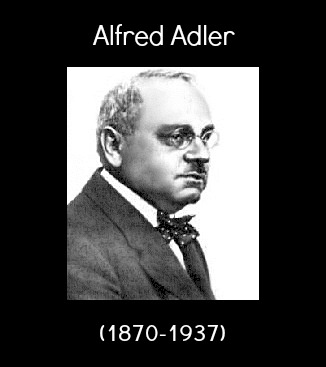Psychology Classics On Amazon

Adlerian Psychology: 8 Basic Principles
Classic Article by Nita Arnold from 1951
The Article in Full
What basic principles of Adlerian Psychology should be accepted by every Adlerian? Before we can answer this question we have to clarify: what is Adlerian Psychology? It is a science developed by Adler which attempts to understand and explain human behavior. Not all psychologists try to do this. As a student of psychology, on might be interested in testing or measuring, in animal experimentation in perfecting description of psychoses for the purpose of diagnosing mental illness. All of these approaches will not make you an Adlerian or exclude you from being one.
Adlerian Psychology is interpretative; it is an endeavor to understand human behavior. There are other psychologies which, like that of Adler, are dynamic, depth psychologies. Principal among these are the systems of Freud and Jung. However, Adler has developed his science in a direction essentially different from that of Freud and Jung Some of his principles are not exclusive to his psychology nor are they original with Adler. Similar ideas, in some instances, have been expressed either in philosophy centuries ago or even in psychology shortly before the publication of his chief works.
It is rather the totality of Adler's principles, woven together into a workable system, which give a key to the understanding of human behavior and the possibility of altering it. This is his great contribution, and it is the acceptance of this system in totality which makes an Adlerian.
In all fields where human behavior, either individually or in group is studied, as in psychology, anthropology, sociology, criminology psychiatry, or where efforts are made to alter behavior, as in education or psychotherapy, his system is applicable. All principles of his system are interdependent; therefore, the following enumeration of such principles in numerical order is by necessity artificial.
1. Life is directed movement. The moving force is the desire for survival, the goal is security. Life may be interpreted as a movement to compensate for inferiority feelings, as if one wanted to reach a point above from below, where one would be freed from all inferiority feelings.
2. The goal of security determines all our actions, but the concept of security differs in all individuals. This concept of security, or success, is formed in the early years of childhood, about the first five year of age, in accordance with the early experiences in the limited environment of the child.
It is then that the child forms his life plan or life pattern, which is a plan - his own unique creation - for getting along in such a world as he sees and has come to know. He sets his goal, which is his concept of security; he devises methods, choosing some and discarding others. It short, he develops his life style, which is his way of relating himself to life.
His goal of security naturally can never be reached; it is not know to him consciously and could not be expressed by him verbally. This goal determines all expressions of his personality, his actions, feelings words, dreams, what he forgets, and what he remembers.
3. All behavior is purposeful; we are not driven by a cause, but drawn by our goal, which, however, we were free to set in our childhood. Once the goal is set we are determined by it in all our action' as if "caught in an iron shirt."
4. Adler calls his psychology "Individual Psychology," according to the Latin individere, "do not divide." The organism-as-a-whole acts and reacts always in totality, never only through one of its parts.
5. An individual's behavior can only be understood in relation to society. Here, his specific unique concept of security causes him to develop either cooperative or other methods in his effort to achieve success, based on his fictitious "private logic." Adler found that early recollections and dreams have a specific meaning to the individual and fit into his purposeful pattern of behavior.
6. Adler came to his discoveries from the observation of "abnormal behavior." Thus he found a new approach to psychopathology. Abnormal behavior, criminal actions, problem children, prostitution, sexual pathology, can be understood by the application of the above mentioned general principles.
7. Furthermore, an Adlerian also believes in the possibility of altering behavior; this alteration can be achieved by scientfic methods developed by Adler. An Alderian applies specific methods of education or Adlerian psychotherapy in his respective field as teacher, parent, physician etc., based on a framework of general principles. They are essentially an attempt to recognize the goal of the individual, his life plan, the methods he uses to relate himself to life, and to give this knowledge to him. This understanding provides "insight. It is an essentially Adlerian approach to encourage in order to change the patient's misconceptions of life which he formed in his early childhood. This enables him to give up his efforts to secure himself according to his private concepts and to accept a cooperative goal. Then he can learn to use cooperative methods. Adlerian therapy helps him develop his social feeling which we all have at birth but which, according to Adler, has to be developed.
8. An Adlerian is one who accepts Adler's principles of psychology of psychopathology, and uses his methods, applying his science in all fields of life for the welfare of the people.
Adlerian Psychology: Deepening Understanding and Application
Adlerian psychology, developed by Alfred Adler, is a comprehensive approach to understanding human behavior, personality development, and the therapeutic process. While the foundational aspects of Adlerian psychology, such as the concepts of inferiority feelings, striving for superiority, and social interest, are well covered, a deeper dive into its applications and specific techniques can provide valuable insights for both practitioners and individuals seeking personal growth.
Key Concepts and Their Implications
1. Lifestyle and Life Tasks
Adlerian psychology posits that each individual creates a unique lifestyle, a set of beliefs and behaviors developed early in life, in response to perceived inferiorities. This lifestyle guides a person's actions and reactions throughout life. Understanding one's lifestyle is crucial for personal development and therapeutic intervention. Life tasks, such as work, friendship, and love, are central areas where lifestyle manifests and can be examined for congruence and fulfillment.
2. Family Constellation and Birth Order
Adler placed significant emphasis on the family constellation, including the roles and relationships within the family, and how these shape one's personality. Birth order, or the ordinal position of siblings, is a key element. Adler believed that firstborns, middle children, youngest children, and only children each develop distinct personality traits and coping mechanisms based on their position within the family. Understanding these dynamics can offer insights into interpersonal relationships and self-perception.
3. Early Recollections
In therapy, Adlerians often explore early recollections, which are memories from childhood that individuals recall as significant. These recollections are not seen as objective facts but as subjective narratives that reveal the individual's core beliefs and lifestyle themes. By analyzing these memories, therapists can uncover patterns and provide pathways for change.
Practical Applications of Adlerian Psychology
1. Therapeutic Techniques
Adlerian therapy involves several stages: engagement, assessment, insight, and reorientation. The therapist builds a collaborative relationship with the client (engagement), gathers information about the client's lifestyle and early recollections (assessment), helps the client gain insight into their patterns and beliefs (insight), and encourages new behaviors and attitudes (reorientation). Techniques such as Socratic questioning, guided imagery, and role-playing are commonly used to facilitate this process.
2. Encouragement and Empowerment
Encouragement is a cornerstone of Adlerian therapy. Adlerians believe that individuals are more likely to change when they feel encouraged and capable. Therapists focus on identifying strengths and fostering a sense of competence. Empowerment involves helping clients take responsibility for their lives and choices, fostering independence, and promoting social interest and community involvement.
3. Social Interest and Community Feeling
Social interest, or Gemeinschaftsgefühl, is the sense of belonging and contributing to the greater good. Adler believed that mental health is closely tied to social connectedness and the ability to contribute to society. Promoting social interest involves encouraging clients to develop empathy, cooperation, and a sense of community. This can be fostered through group therapy, community activities, and service-oriented projects.
4. Educational and Preventative Measures
Beyond therapy, Adlerian principles can be applied in educational settings to promote positive development and prevent behavioral issues. Schools can implement Adlerian strategies such as cooperative learning, peer mentoring, and conflict resolution programs to foster a supportive and inclusive environment. Educators can use encouragement and positive reinforcement to help students develop resilience and social skills.
Modern Adaptations and Research
Adlerian psychology continues to evolve and adapt to contemporary issues. Recent research has explored its application in diverse contexts, such as multicultural counseling, organizational development, and trauma therapy. Studies have shown that Adlerian principles, like social interest and encouragement, are effective in promoting mental health and well-being across different populations and settings.
Furthermore, Adlerian psychology's holistic approach aligns well with current trends in integrative and preventative healthcare. By addressing physical, emotional, social, and spiritual aspects of well-being, Adlerian practitioners offer comprehensive care that meets the needs of the whole person.
Conclusion
Adlerian psychology offers a rich and multifaceted approach to understanding human behavior and facilitating personal growth. By delving deeper into its key concepts, therapeutic techniques, and practical applications, we can appreciate its enduring relevance and transformative potential. Whether in therapy, education, or community settings, Adlerian principles provide valuable tools for fostering healthy, fulfilling lives and societies.
This stylish Alfred Adler Heart Shape Word Cloud T-Shirt is perfect for anybody with an interest in Adlerian psychology. Also ideal for helping to promote Adler's groundbreaking concept of social interest "Gemeinschaftsgefühl"; i.e., the importance of feeling engaged and connected with one's community, which is as relevant today as it has ever been. Sales help support All-About-Psychology.Com which has been providing free and comprehensive information and resources for psychology students and educators since 2008.
Recent Articles
-
Promoted Psychology Books | All-About-Psychology.com Showcase
Apr 24, 25 03:20 AM
Discover standout titles featured through expert psychology book promotion. See what authors are sharing—and how their work is reaching new readers. -
All About Psychology
Apr 22, 25 02:37 PM
A psychology website designed to help anybody looking for detailed information and resources. -
Sponsor a Psychology Website with Over a Million Yearly Visitors
Apr 22, 25 10:07 AM
Showcase your brand to a huge, engaged audience. Discover how to sponsor a psychology website trusted by over a million visitors a year.
Please help support this website by visiting the All About Psychology Amazon Store to check out an awesome collection of psychology books, gifts and T-shirts.
Go To The Main Alfred Adler Page
Go From Adlerian Psychology To The Home Page






